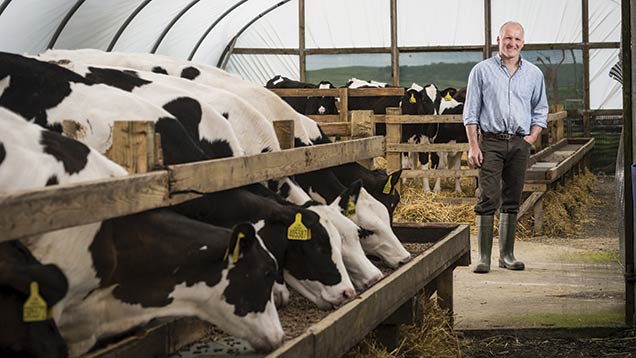Feed mash boosts milk yields on Scottish dairy farm
 Alex Robertson ©Jim Varney
Alex Robertson ©Jim Varney An experiment by Newton Stewart dairy farmer Alex Robertson of adding water to the total mixed ration (TMR) of dairy cows to create a mash has increased milk yields and reduced ration costs.
Milk yields at Coopon Carse Farm have increased by 1.5-2 litres a cow and costs have dropped by 1p to 11.1p/litre of milk by feeding 1kg a cow less of concentrates.
See also: Feeding TMR help cuts feed costs
Mr Robertson began adding water to cow rations after reading about the compact feeding method used in Danish dairy herds, which involves chopping the mix short and adding water to the ration so cows can’t sort.
Coopon Carse Farm, Wigtownshire
- 500 cows averaging 10,500 litres
- Fed a grass silage-based total mixed ration and zero-grazed throughout the summer
- 3-4kg a cow a day of water is added to create a mash of molasses, premix and caustic wheat
- About 2cu m of water is used a day – at negligible cost
“We found that by adding water we were getting more milk with less concentrates,” says Mr Robertson who was a 2014 Farmers Weekly Dairy Farmer of the Year finalist.
Mr Robertson creates a feed mash by adding 3-4kg of water a cow a day to three of the diet’s main ingredients – molasses, premix and home-grown caustic wheat.
The three ingredients are combined in a mixer wagon for a couple of minutes and then turned out into the silage pit and left overnight.
The following morning the mash is mixed with silage from two different pits – one with a dry matter of 38% and one with 28% DM before being fed to the herd’s 500 cows.
Cows are eating about 18kg of the 60% DM feed a day and, since adding water, milk yields have increased to about 33 litres a cow a day.
Mr Robertson can’t explain why milk yields have increased, but believes one of the reasons is because there’s less sorting of the diet.
“Sorting wasn’t really an issue before, but we would see it now and again. We don’t really see it now,” he says.
He also believes cows are more likely to be able to use the energy from the minute the food is in the rumen because it will have already been broken down a bit by being soaked in water.
He says: “Adding water also creates more of a consistent mix. The sugar beet pellets are broken down, so you can’t actually find any pellets to pick out.
“It could also make the mix sweeter and the pellets are spread out more evenly across the load.”
Pre-soaking concentrates isn’t really creating any more workload for the team at Coopon Carse – in fact, it is saving staff time in the morning, says Mr Robertson.
“The mash takes about 10-15 minutes to make in the afternoon, and has actually saved some time in the morning.
“At the moment we are using a hosepipe to add the water, but we plan on installing a tank,” he says.
The mash must be used in about 24 hours to prevent spoiling, adds Keenan nutritionist Hugh Kerr.
“It’s really important the mash does not go off and that it is not made too wet.” Mr Robertson uses weigh cells on his mixer wagon to ensure only 3-4kg of water is added for every cow.
Mr Kerr reckons Mr Robertson is now 60p a cow a day better off since adding the water, with 50p of that coming from extra milk produced and 10p coming from the fact cows are now eating slightly less.
“We are not quite sure why cows are eating slightly less, but it could be that they had just got enough energy from the feed so stopped eating.
“Cows won’t continue eating when their needs have been met. It could also be a combination of the feed being slightly bulkier,” he adds.
